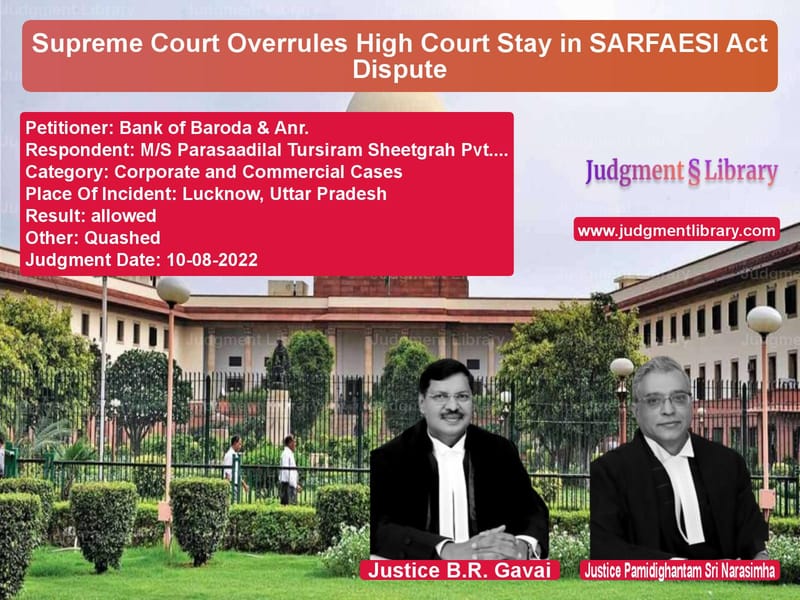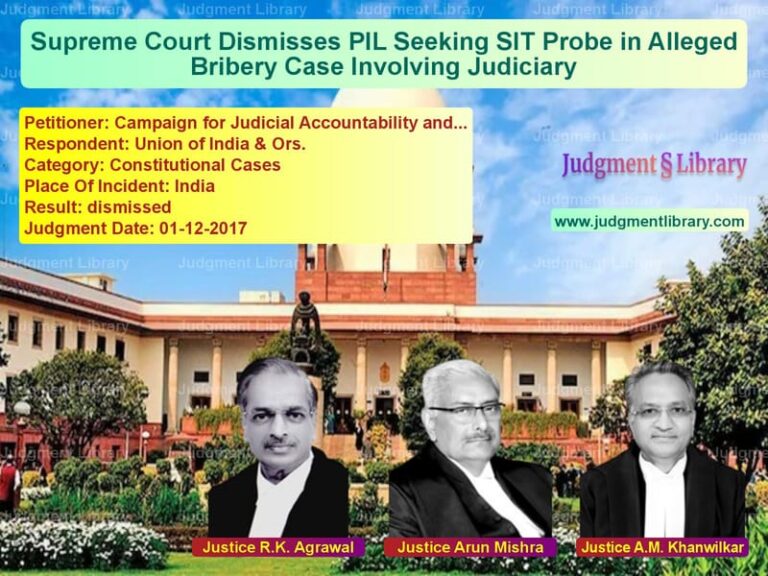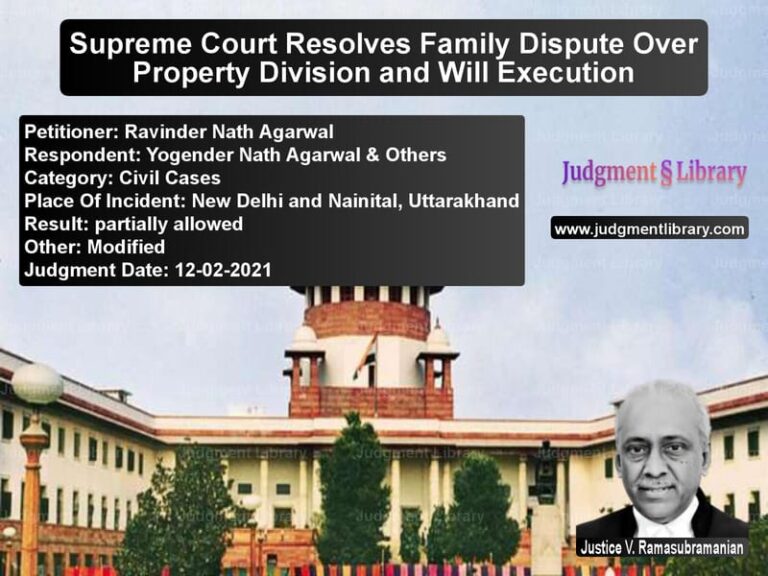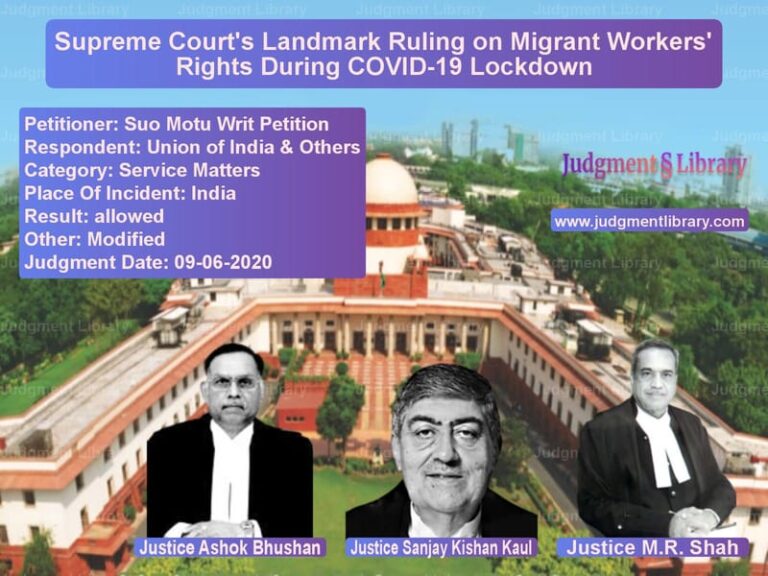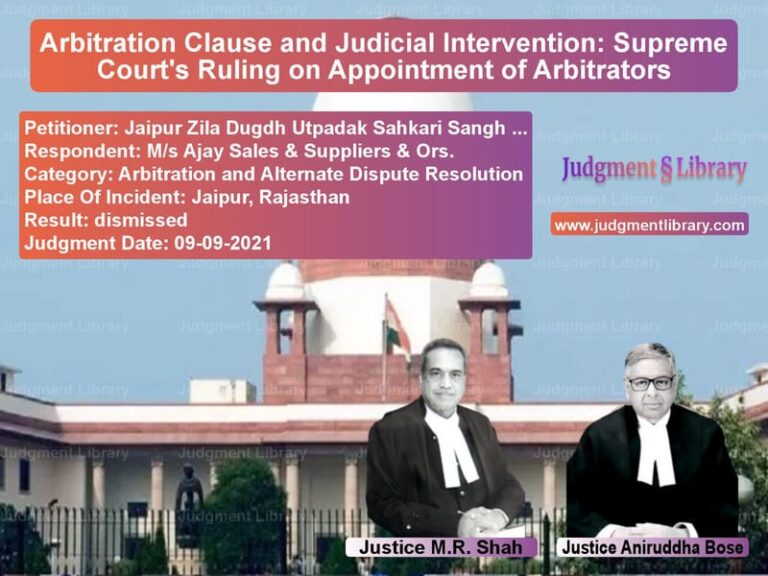Supreme Court Overrules High Court Stay in SARFAESI Act Dispute
The case of Bank of Baroda & Anr. vs. M/S Parasaadilal Tursiram Sheetgrah Pvt. Ltd. & Ors. concerns the enforcement of security under the SARFAESI Act, 2002. The Supreme Court set aside an interim stay order granted by the Allahabad High Court, emphasizing the need for swift resolution of secured asset disputes.
Background of the Case
The respondent company, M/S Parasaadilal Tursiram Sheetgrah Pvt. Ltd., had availed of credit facilities from the Bank of Baroda. When the company defaulted on repayments, the bank initiated proceedings under the SARFAESI Act.
The bank issued notices under Sections 13(2) and 13(4) of the SARFAESI Act demanding payment of Rs. 2,34,15,456. When payments were not made, the secured asset was auctioned, and a sale certificate was issued to the highest bidder.
Legal Issues Before the Court
- Whether the High Court was justified in staying the Debt Recovery Appellate Tribunal’s (DRAT) order dismissing the borrower’s challenge.
- Whether the borrower’s application under Section 17 of the SARFAESI Act was barred by limitation.
- Whether the sale of the secured asset was legally valid.
Arguments Presented
Petitioner’s (Bank of Baroda’s) Arguments
- The bank argued that the SARFAESI Act mandates quick enforcement of security to prevent prolonged litigation.
- The Debt Recovery Tribunal (DRT) dismissed the borrower’s challenge on the ground of limitation, which was upheld by the DRAT.
- The High Court’s stay order was unjustified as it prolonged the dispute and delayed possession transfer to the auction purchaser.
Respondents’ (Borrower’s) Arguments
- The borrower claimed that the sale was illegal since the legal representatives of one of the directors were not issued notice.
- They contended that the delay in filing under Section 17 should have been condoned as they were unaware of the auction proceedings.
- They requested the High Court to stay the DRAT’s order until the final disposal of their writ petition.
Supreme Court’s Observations
On Timely Resolution Under the SARFAESI Act
The Supreme Court, comprising Justice B.R. Gavai and Justice Pamidighantam Sri Narasimha, reaffirmed the objective of the SARFAESI Act.
“The SARFAESI Act is enacted for quick enforcement of security. It is unfortunate that proceedings where third-party rights have been created under the Act have remained inconclusive even after a decade.”
On the Limitation of Borrowers’ Application
The Court held that the borrower’s Section 17 application was barred by limitation.
“The limitation period for filing under Section 17 is 45 days from the date of enforcement measures under Section 13(4). The borrower failed to act within this period.”
On the High Court’s Interim Stay
The Court criticized the High Court for granting an interim stay despite the DRAT upholding the sale process.
“The High Court was not justified in staying the DRAT’s order, which had concluded that there was no error apparent in the DRT’s dismissal of the borrower’s application.”
Judgment and Its Implications
The Supreme Court allowed the appeal, setting aside the High Court’s interim stay order.
- The High Court was directed to dispose of the writ petition within three months.
- The order reaffirmed that limitation periods in SARFAESI Act cases must be strictly adhered to.
- The decision reinforced that courts should not interfere unnecessarily with DRAT decisions.
Significance of the Judgment
- Speeds Up Secured Asset Recovery: The ruling prevents borrowers from delaying proceedings by approaching the High Court.
- Limits Judicial Intervention: The judgment ensures that writ courts do not disrupt the SARFAESI Act’s objectives.
- Reinforces Limitation Rules: The decision confirms that delay in filing under Section 17 cannot be excused without just cause.
Conclusion
The Supreme Court’s ruling in Bank of Baroda vs. M/S Parasaadilal Tursiram Sheetgrah Pvt. Ltd. ensures that secured creditors can enforce their rights without undue delay. By setting aside the High Court’s stay order, the judgment strengthens the SARFAESI Act’s framework for expeditious resolution of debt recovery disputes.
Petitioner Name: Bank of Baroda & Anr..Respondent Name: M/S Parasaadilal Tursiram Sheetgrah Pvt. Ltd. & Ors..Judgment By: Justice B.R. Gavai, Justice Pamidighantam Sri Narasimha.Place Of Incident: Lucknow, Uttar Pradesh.Judgment Date: 10-08-2022.
Don’t miss out on the full details! Download the complete judgment in PDF format below and gain valuable insights instantly!
Download Judgment: bank-of-baroda-&-anr-vs-ms-parasaadilal-tur-supreme-court-of-india-judgment-dated-10-08-2022.pdf
Directly Download Judgment: Directly download this Judgment
See all petitions in Bankruptcy and Insolvency
See all petitions in Corporate Compliance
See all petitions in unfair trade practices
See all petitions in Judgment by B R Gavai
See all petitions in Judgment by P.S. Narasimha
See all petitions in allowed
See all petitions in Quashed
See all petitions in supreme court of India judgments August 2022
See all petitions in 2022 judgments
See all posts in Corporate and Commercial Cases Category
See all allowed petitions in Corporate and Commercial Cases Category
See all Dismissed petitions in Corporate and Commercial Cases Category
See all partially allowed petitions in Corporate and Commercial Cases Category

